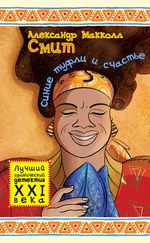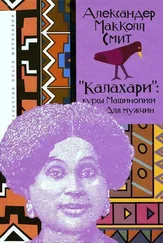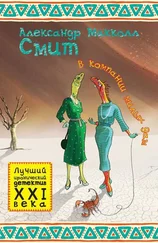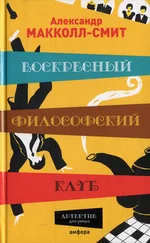‘You can tell that he is happy,’ she said to Mma Makutsi. ‘Listen. That is the noise that a cat makes when it has been fed and is happy with the world. He is purring, Mma. You have the only purring baby in Botswana.’
‘I am very happy that he purrs,’ said Mma Makutsi. ‘Maybe that means he’s a little lion. When he grows up he will be brave and strong – like a lion.’
Mma Ramotswe had laughed, but the comment had triggered a memory that came back to her now, none the less vivid for not having been thought about for years – since childhood, in fact. She closed her eyes for a moment, as if to fix the recollection in her mind before it vanished, as old thoughts can so easily do. For a few moments she was back in Mochudi, still a girl, sitting with her father’s cousin, who had helped bring her up, and the cousin had told her a story that she herself must have learned from her grandmother or an aunt or somebody of the generation that still stored all these traditional stories in some corner of their minds.
‘A lion,’ muttered Mma Ramotswe. ‘There was a story about that.’
Mma Makutsi planted a kiss on Itumelang’s brow. ‘About a boy who was as brave as a lion? Like my Itumelang?’
Mma Ramotswe shook her head. ‘I was told it a long time ago by my daddy’s cousin. She was the one who helped him when I was a girl.’
Mma Makutsi inclined her head respectfully. She knew about Mma Ramotswe’s early years. ‘After your mother became late?’
‘Yes,’ said Mma Ramotswe. ‘The cousin was older than my late daddy. She was like a grandmother to me.’
‘They are the ones for stories,’ said Mma Makutsi. ‘They know all those stories about things that happened a long time ago – or did not happen.’
‘It doesn’t matter if they did not happen,’ said Mma Ramotswe. ‘There are many stories about things that did not happen.’ She paused. ‘This one was about a girl who married a lion. She did not know it when she married him, but the young man she had chosen was really a lion. He looked like an ordinary man, but there was something about him…’
‘It would be the eyes,’ said Mma Makutsi, glancing anxiously at Itumelang’s eyes to reassure herself. ‘You can tell if somebody is really a lion by examining the eyes. Lions have eyes that are a bit yellow, Mma. They are like the colour of grass when there has been no rain for a while. Or sometimes they are the colour of the sand out in the Kalahari, which is also a sort of yellow colour.’
‘I think that what makes a lion’s eyes different from other eyes is their fierceness,’ said Mma Ramotswe. ‘There are other animals that have eyes that colour, but they are different. They are not fierce, like a lion’s eyes. They do not look at you in the same way – they do not make you wish you were somewhere else.’
Mma Makutsi agreed. ‘But what about this girl?’ she asked. ‘How did she know he was a lion? Was it the eyes, do you think?’
Mma Ramotswe shook her head. ‘No, it was not the eyes. She did not say anything about his eyes; in fact, it was her brothers who noticed. It was the girl’s brothers.’
‘They could tell?’
‘Yes, Mma. They noticed that by the way he smelled. If you are a lion, you cannot really disguise the way you smell. You can change the way you look, but not the way you smell.’
Mma Makutsi was thoughtful. ‘It is the same with people,’ she said. ‘You can change your clothes. You can change the look of your hair. Doctors can even change the shape of your nose or ears, but you can never change the way you smell. That will always give you away.’
Mma Ramotswe was used to Mma Makutsi’s theories, which were often rather unusual. This one, she thought, was distinctly unlikely, but she did not want to pursue the matter. Mma Makutsi was apt to argue a point tenaciously, and Mma Ramotswe did not want to get involved in a prolonged debate on the way people smelled.
‘That may be so, Mma,’ she said evenly. ‘Or it may not be. But the point here is that the girl’s brothers told her they thought her new husband was a lion because he smelled a bit like a lion. And they said there was also something in the way he walked that reminded them of a lion.’
‘Lions walk on four legs,’ observed Mma Makutsi. ‘Was this man walking on four legs? That can be a big giveaway, Mma.’
Mma Ramotswe shook her head. ‘He walked normally, on two legs. But there was something in the way he walked that made them suspicious. I do not know what it was, as my cousin did not say anything about that. But you can imagine it, Mma, can’t you? He would have walked with that sort of sway that lions like to use. They sway their hips a bit.’
‘I have seen men walk like that,’ said Mma Makutsi. ‘But I did not think they were lions.’
‘So they told the girl, Mma,’ continued Mma Ramotswe. ‘They said to her: this new husband is really a lion. You will have to get rid of him. And the girl was very upset.’
‘It would not be a good thing to discover about your new husband,’ said Mma Makutsi. ‘I don’t know what I would do if I discovered that Phuti was a lion. It would be a very sad thing to find out.’
‘I do not think your husband is a lion,’ said Mma Ramotswe. ‘I see no evidence at all.’
‘Thank heavens,’ said Mma Makutsi. ‘It would be hard for me to go back up to Bobonong and tell my family. They would say: please do not bring your new husband up here, or he might eat our cattle.’
They both laughed. Then Mma Makutsi said, ‘I am worried about this young woman, Mma. What did they do?’
‘The brothers made a cage,’ said Mma Ramotswe. ‘This cage was a trap and they put a goat in it. They said, “If our sister’s husband is really a lion, then he will smell the goat and he will go into the cage to eat it. Then the trap will close on him and we shall know.”’
‘And is that what happened?’
‘Yes,’ said Mma Ramotswe. ‘And once he was in the trap, the new husband showed that he really was a lion. He began to roar, and they saw that his teeth were like the teeth of a lion. They saw all this, Mma, and they knew. The girl, of course, was upset, but I think she got over it, once her brothers had chased her husband away.’
‘It was best to have discovered it,’ said Mma Makutsi. ‘I could not live with the uncertainty of not knowing if my husband was a lion. Could you, Mma? Could you live with uncertainty like that?’
Mma Ramotswe could not. ‘It is best for a woman to know her husband’s weak points right at the beginning. All men have their weak points – although they try to pretend that they do not have any, they are always there. But if you know about them in advance, then you can deal with them. It is the hidden weak points that are the problem.’
They were both silent for a while. Itumelang looked up at his mother, and made his slight gurgling sound. Mma Makutsi was wondering about Phuti’s weak points. There was his stammer, of course, and there was also his artificial foot and ankle – the result of that accident with the delivery truck. But although one might think of these as weak points, they were not weaknesses. Weak points were things that had happened to him. Weaknesses were character flaws, and Phuti had none of those.
The mention of weak points had Mma Ramotswe thinking about her own husband. Did Mr J. L. B. Matekoni have any weaknesses? He had been a bit indecisive in taking so long over their engagement, but that indecisiveness was probably a result of his simply not being forceful enough, which was a rather attractive quality, she thought. There were more than enough forceful men about, and a man who did not try to force his will on others was a refreshing change. As far as the other common vices went, Mr J. L. B. Matekoni had none of those: he did not drink much – other than the occasional beer – and he was never selfish. He did not gamble, nor did he look at other women, although that did not mean that other women did not look at him; Mma Ramotswe had seen them, and imagined the thoughts going through their heads: Now there’s a nice, gentle-looking man… Oh, yes, she could just hear those thoughts, but they did not worry her unduly because she understood how those who did not have the company of a good man, who had been saddled with a bad or indifferent one, with one who never paid them much attention or showed them any affection – she could understand how such women might lay eyes on a man like Mr J. L. B. Matekoni and dream. She did not begrudge such women their dreams. And it was a compliment to Mr J. L. B. Matekoni that women should think such things about him, and usually the women who thought these things did not go on to flirt with him or anything like that. Except sometimes, and in those rare cases Mr J. L. B. Matekoni was always polite and would make a pointed reference to something his wife had said or done, and that was usually enough to put a stop to that. Unless you were somebody like Violet Sephotho, of course; she was shameless and would, if anything, be encouraged if mention were made of a wife. Mma Makutsi had many stories to tell of Violet’s husband-stealing activities, including one occasion when she had flirted with a new husband at his wedding . Fortunately the new mother-in-law had witnessed this and had managed to seat Violet next to an uncle who was a lay preacher and whose only topic of conversation was the Bible.
Читать дальше







![Александр Макколл Смит - Отдел деликатных расследований [litres]](/books/397661/aleksandr-makkoll-smit-otdel-delikatnyh-rassledova-thumb.webp)




